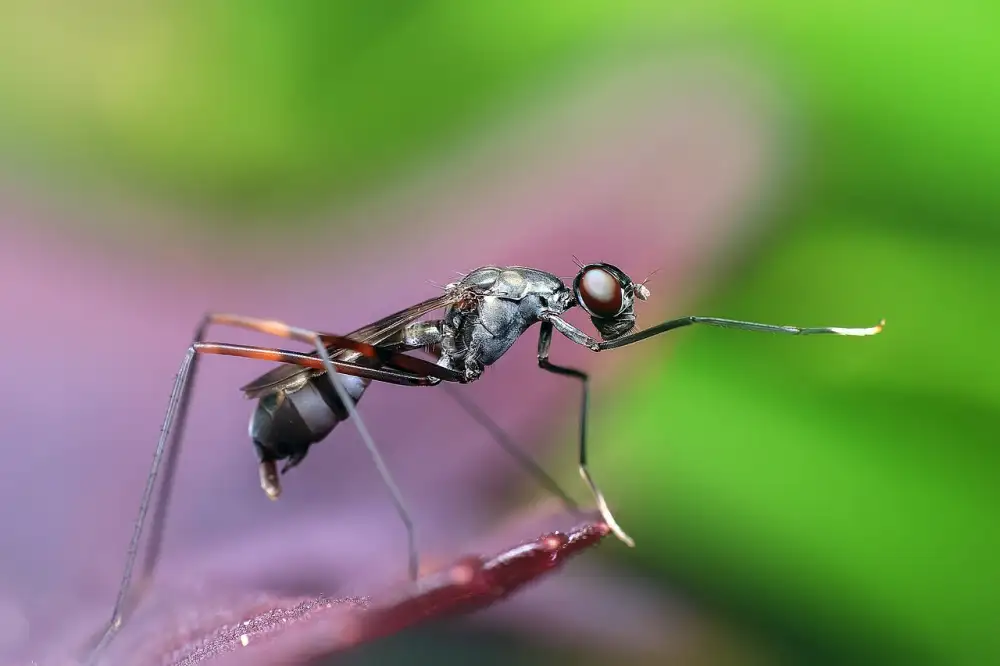Ants Be Gone: Mastering the Art of Eliminating Kitchen Ants

- Importance of maintaining a clean and ant-free kitchen
- Overview of the common ant species found in kitchens
- Identify the ant problem
- Signs of ant infestation in the kitchen
- Determining the ant species to choose the most effective solution
- Prevention methods
- Keeping the kitchen clean and free of food debris
- Properly storing food to prevent ant access
- Sealing cracks and gaps to block ant entry points
- Natural remedies
- Using vinegar and water solution to repel ants
- Sprinkling cinnamon or coffee grounds as a deterrent
- Placing cucumber or citrus peels near ant trails
- Commercial ant baits and traps
- Overview of different ant baits available in the market
- Proper placement and usage of ant traps
- Professional pest control
- When to consider professional help for severe infestations
- Choosing a reputable pest control service
- Maintenance and long-term prevention
- Regular cleaning and maintenance practices to deter ants
- Monitoring for any signs of reinfestation
- Recap of key points discussed
- Encouragement to take immediate action to eliminate ants in the kitchen
Maintaining a clean and ant-free kitchen is essential for ensuring the safety and hygiene of your food preparation area. Ants are common pests that can contaminate your food and spread harmful bacteria. In order to master the art of eliminating kitchen ants, it is important to understand the different ant species commonly found in kitchens.
There are several species of ants that are attracted to kitchens due to the abundance of food sources. The most common ones include Argentine ants, odorous house ants, pavement ants, and pharaoh ants. Each species has its own unique characteristics and behaviors, which will determine the most effective methods for eradication.
By identifying the signs of ant infestation in your kitchen and determining the specific ant species present, you can choose the most appropriate solutions to eliminate them effectively. In this article, we will explore various prevention methods, natural remedies, commercial ant baits and traps, as well as when it may be necessary to seek professional pest control services. Let's dive into mastering the art of eliminating kitchen ants!
Importance of maintaining a clean and ant-free kitchen
Maintaining a clean and ant-free kitchen is of utmost importance for several reasons. Firstly, ants can contaminate food with bacteria and pathogens they carry, posing a health risk to you and your family. Secondly, ants can cause damage to your kitchen by chewing through packaging and building nests in walls or appliances. Lastly, an ant infestation can be difficult to eradicate once it takes hold, so prevention is key. By keeping your kitchen clean and free of ants, you ensure a safe and hygienic environment for cooking and food preparation.
Overview of the common ant species found in kitchens
There are several common ant species that can be found in kitchens. The most prevalent ones include the Argentine ant, the odorous house ant, and the pavement ant. Argentine ants are small and light brown in color, often forming large colonies. Odorous house ants emit a strong smell when crushed and are attracted to sweets. Pavement ants are dark brown or black and typically nest under sidewalks or driveways but can also invade kitchens in search of food. Understanding these species is crucial for effective ant control strategies.
Identify the ant problem
Identifying the ant problem is crucial in effectively eliminating kitchen ants. Look out for signs such as trails of ants, particularly near food sources or along walls. Ants are attracted to sweet, greasy, and sugary foods. By observing the ants closely, you can determine their species, which will help in selecting the most suitable solution. Common ant species found in kitchens include Argentine ants, carpenter ants, and odorous house ants.
Signs of ant infestation in the kitchen
Signs of ant infestation in the kitchen can include the presence of ant trails, especially near food sources. These trails are often visible along walls, countertops, or floors. Another sign is finding small piles of dirt or debris near cracks or crevices where ants may be nesting. Additionally, if you notice an increase in ant activity after leaving out food or crumbs overnight, it is likely a sign of an infestation. It's important to identify the specific ant species to determine the most effective solution for elimination.
Determining the ant species to choose the most effective solution
Determining the ant species is crucial in choosing the most effective solution for elimination. Common ant species found in kitchens include Argentine ants, odorous house ants, and carpenter ants. Argentine ants are small and light brown, while odorous house ants emit a distinct smell when crushed. Carpenter ants are larger and can cause structural damage. Identifying the ant species helps in selecting targeted baits or repellents that specifically address their behavior and preferences. Consultation with a pest control professional can aid in accurate identification and appropriate treatment.
Prevention methods
Prevention is key when it comes to keeping ants out of your kitchen. Start by maintaining a clean and clutter-free environment. Regularly sweep and mop the floors, wipe down countertops, and wash dishes promptly. Ants are attracted to food debris, so make sure to clean up spills and crumbs immediately.
Properly storing food is another important step in preventing ant infestations. Keep all food items tightly sealed in containers or bags. This will not only prevent ants from accessing the food but also help maintain its freshness.
Sealing cracks and gaps in walls, windows, and doors is crucial in blocking ant entry points. Ants can squeeze through even the tiniest openings, so use caulk or weatherstripping to seal any potential access points.
By implementing these prevention methods, you can significantly reduce the likelihood of ants invading your kitchen.
Keeping the kitchen clean and free of food debris
Keeping the kitchen clean and free of food debris is crucial in preventing ant infestations. Ants are attracted to food sources, so eliminating their access to these sources is essential. Regularly sweep and mop the floors, wiping up any spills or crumbs immediately. Clean countertops, sinks, and other surfaces regularly with a mild detergent. Store food in airtight containers and promptly dispose of any expired or rotting items. By maintaining a clean kitchen, you can greatly reduce the chances of ants entering your space.
Properly storing food to prevent ant access
Properly storing food is crucial in preventing ants from accessing your kitchen. Keep all food items, especially sweet and sugary ones, in tightly sealed containers made of glass or plastic. Ants are attracted to the scent of food, so make sure there are no crumbs or spills left behind on countertops or floors. Additionally, store fruits and vegetables in the refrigerator to minimize their appeal to ants. By taking these precautions, you can effectively prevent ants from infiltrating your kitchen and contaminating your food.
Sealing cracks and gaps to block ant entry points
Sealing cracks and gaps is an essential step in preventing ants from entering the kitchen. Ants can squeeze through even the tiniest openings, so it's crucial to thoroughly inspect the kitchen for any potential entry points. Common areas to check include windows, doors, baseboards, and pipes. Use caulk or weatherstripping to seal these gaps and cracks effectively. By blocking these entry points, you can significantly reduce the chances of ants finding their way into your kitchen.
Natural remedies
Natural remedies are a popular and effective way to eliminate kitchen ants. One simple solution is to create a vinegar and water mixture in a spray bottle. Ants dislike the strong smell of vinegar, so spraying it along their trails or entry points can deter them. Another option is to sprinkle cinnamon or coffee grounds near areas where ants are commonly seen. These substances disrupt their scent trails and discourage them from entering the kitchen. Additionally, placing cucumber or citrus peels near ant trails can also repel them due to the natural oils they contain. These natural remedies provide a safe and eco-friendly alternative to chemical pesticides while effectively keeping ants at bay in your kitchen.
Using vinegar and water solution to repel ants
One effective natural remedy to repel ants is using a vinegar and water solution. Vinegar contains acetic acid, which disrupts the ants' scent trails and makes it difficult for them to navigate. To create the solution, mix equal parts of white vinegar and water in a spray bottle. Spray this mixture along ant trails, entry points, and areas where you have seen ants. The strong smell of vinegar will deter ants from entering your kitchen. Remember to reapply the solution regularly, especially after cleaning or wiping down surfaces.
Sprinkling cinnamon or coffee grounds as a deterrent
One natural remedy to deter ants from invading your kitchen is by sprinkling cinnamon or coffee grounds in areas where ants are commonly found. Both cinnamon and coffee grounds have strong scents that ants dislike, making them effective deterrents. Simply sprinkle these substances along ant trails, near entry points, or in areas where you have seen ant activity. The strong smell will help repel the ants and discourage them from entering your kitchen. Remember to reapply the cinnamon or coffee grounds regularly for continued effectiveness.
Placing cucumber or citrus peels near ant trails
Placing cucumber or citrus peels near ant trails can be an effective natural remedy to deter ants. Ants have a strong aversion to the scent of these fruits, which can disrupt their pheromone trails and discourage them from entering your kitchen. Simply place slices of cucumber or citrus peels in areas where ants are commonly seen, such as along windowsills or near entry points. Replace the peels regularly to maintain their effectiveness. Remember, this method may not completely eliminate the ant problem but can help deter them from entering your kitchen.
Commercial ant baits and traps
Commercial ant baits and traps are effective solutions for eliminating kitchen ants. There are various types available in the market, such as gel baits, liquid baits, and bait stations. Gel baits contain a sweet attractant mixed with a slow-acting insecticide that ants consume and carry back to their colony, eventually killing the entire population. Liquid baits work similarly but come in a liquid form that ants can easily transport. Bait stations provide a controlled environment for ants to access the bait while keeping it away from children and pets. Proper placement of these traps near ant trails or entry points is crucial for success. Remember to follow instructions carefully and be patient, as it may take some time for the bait to work effectively.
Overview of different ant baits available in the market
There are several types of ant baits available in the market that can effectively eliminate kitchen ants. These baits work by attracting ants with a food-based lure, which they then carry back to their colony, ultimately leading to the elimination of the entire ant population.
Some common types of ant baits include gel baits, liquid baits, and granular baits. Gel baits are easy to apply and can be placed in small cracks or crevices where ants are commonly found. Liquid baits come in pre-filled bait stations and can be placed along ant trails or near entry points. Granular baits are sprinkled around areas where ants frequent.
It is important to choose an ant bait that is specifically designed for the type of ants infesting your kitchen. Different species have different preferences for food sources, so using the right bait will increase its effectiveness.
When selecting an ant bait, look for products that contain slow-acting insecticides. This allows the ants enough time to carry the bait back to their colony before it takes effect, ensuring maximum impact on the entire population.
Remember to always read and follow the instructions provided by the manufacturer when using ant baits. Proper placement and usage will ensure optimal results in eliminating kitchen ants.
Proper placement and usage of ant traps
Proper placement and usage of ant traps is crucial for effective elimination of kitchen ants. Place the traps along ant trails, near entry points, and in areas where ants are frequently seen. Ensure that the traps are not obstructed by any objects or food debris. Avoid placing traps directly on countertops or surfaces where food is prepared. Follow the instructions provided by the manufacturer for optimal usage. Monitor the traps regularly and replace them when they become full or ineffective. Remember to keep children and pets away from the traps to prevent accidental ingestion.
Professional pest control
6. Professional pest control
When all else fails and the ant infestation in your kitchen becomes severe, it may be time to consider professional pest control services. Pest control professionals are trained to effectively eliminate ants and prevent future infestations.
A reputable pest control service will conduct a thorough inspection of your kitchen to identify the extent of the infestation and determine the type of ants present. They will then develop a customized treatment plan tailored to your specific situation.
Professional pest control methods often involve the use of insecticides that are safe for humans but lethal to ants. These treatments target ant colonies, eliminating them at their source. Additionally, pest control experts can provide advice on long-term prevention strategies to keep your kitchen ant-free.
It is important to choose a reputable pest control company with experience in dealing with ant infestations. Look for companies that are licensed, insured, and have positive customer reviews. Don't hesitate to ask for references or seek recommendations from friends or family members.
Remember, professional pest control should be considered as a last resort when other methods have failed or when the infestation is severe. Taking prompt action and seeking professional help will ensure a clean and ant-free kitchen environment for you and your family.
When to consider professional help for severe infestations
When dealing with severe ant infestations in the kitchen, it may be necessary to consider professional pest control services. If the infestation persists despite your efforts to eliminate it, or if you are unable to identify and locate the ant nest, seeking professional help is recommended. Professional pest control technicians have the expertise and knowledge to effectively handle severe infestations and use specialized treatments that may not be available to consumers. They can assess the extent of the problem, identify the ant species accurately, and implement targeted solutions to eradicate the infestation. Remember, prompt action is crucial in preventing further damage and ensuring a clean and ant-free kitchen environment.
Choosing a reputable pest control service
Choosing a reputable pest control service is crucial when dealing with severe ant infestations. Look for companies that are licensed and insured, as this ensures they meet industry standards. Additionally, consider their experience and reputation by checking online reviews and asking for recommendations from friends or family. It's important to choose a service that uses safe and effective methods to eliminate ants without causing harm to you or your kitchen.
Maintenance and long-term prevention
Maintenance and long-term prevention are crucial in keeping your kitchen ant-free. Regular cleaning and maintenance practices play a significant role in deterring ants. Ensure that all surfaces are cleaned thoroughly, especially after food preparation. Wipe down countertops, sweep the floors, and clean up any spills promptly. Additionally, regularly empty the trash and keep it sealed tightly. By eliminating potential food sources, you can discourage ants from entering your kitchen. Monitor for any signs of reinfestation, such as ant trails or nests, and take immediate action if necessary. Remember, consistency is key in maintaining an ant-free environment in your kitchen.
Regular cleaning and maintenance practices to deter ants
Regular cleaning and maintenance practices are essential in deterring ants from infesting the kitchen. Start by wiping down countertops, tables, and floors with a mixture of vinegar and water to eliminate any ant trails or scent markers. Vacuuming regularly can also help remove any food crumbs that may attract ants. Additionally, make sure to promptly clean up spills and store all food in sealed containers to deny ants access to their food source. Regularly inspecting and sealing cracks or gaps in walls, windows, and doors will further prevent ant entry points. By implementing these simple cleaning practices, you can effectively deter ants from your kitchen and maintain an ant-free environment.
Monitoring for any signs of reinfestation
Monitoring for any signs of reinfestation is crucial to ensure a long-term ant-free kitchen. Regularly inspecting the kitchen for any ant activity, such as trails or nests, is important. Pay close attention to areas where food crumbs or spills may accumulate, as these can attract ants. If any signs of ants are found, take immediate action to eliminate them using the appropriate methods discussed earlier. By staying vigilant and proactive in monitoring the kitchen, you can prevent future infestations and maintain a clean and ant-free environment for your culinary endeavors.
In conclusion, maintaining a clean and ant-free kitchen is crucial for both hygiene and food safety. By identifying the signs of ant infestation and determining the ant species, you can choose the most effective solution. Prevention methods such as keeping the kitchen clean, properly storing food, and sealing cracks are essential. Natural remedies like vinegar, cinnamon, coffee grounds, cucumber, and citrus peels can also help repel ants. Commercial ant baits and traps are available for more severe infestations. If necessary, seek professional pest control services from reputable providers. Remember to regularly clean and monitor for any signs of reinfestation to ensure a long-term ant-free kitchen. Take immediate action to eliminate ants in your kitchen for a healthier cooking environment.
Recap of key points discussed
In conclusion, maintaining a clean and ant-free kitchen is crucial for a healthy and hygienic cooking environment. By identifying the signs of ant infestation and determining the ant species, you can choose the most effective solution. Prevention methods such as keeping the kitchen clean, properly storing food, and sealing cracks are essential. Natural remedies like vinegar, cinnamon, coffee grounds, cucumber, and citrus peels can also help repel ants. Commercial ant baits and traps provide additional options for elimination. For severe infestations, professional pest control may be necessary. Regular maintenance practices and monitoring will ensure long-term prevention of ants in your kitchen. Take immediate action to eliminate ants and enjoy a pest-free culinary experience!
Encouragement to take immediate action to eliminate ants in the kitchen
It is crucial to take immediate action to eliminate ants in the kitchen. Not only can they contaminate food, but they also pose a health risk by spreading bacteria. Delaying treatment can lead to a larger infestation and make it more difficult to eradicate the problem. By following the prevention methods and utilizing natural remedies or commercial ant baits, you can effectively eliminate ants from your kitchen and maintain a clean and safe environment for cooking. Don't wait, start taking action today!
Published: 26. 02. 2024
Category: Home



